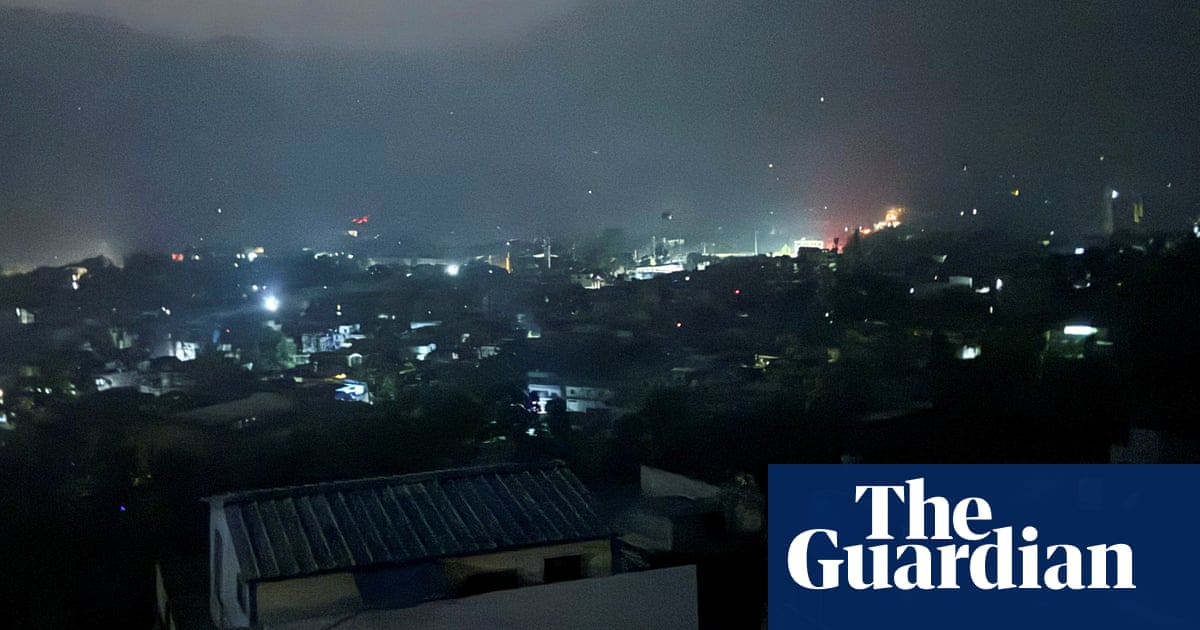At least eight people, including a child, have been killed and 35 injured after India launched attacks on what it claimed were nine sites of “terrorist infrastructure” inside Pakistan and Pakistani Kashmir, in a sharp escalation of hostilities between the two nuclear-armed neighbours.
Loud explosions were heard early on Wednesday, and power was knocked out in Muzaffarabad, the capital of Pakistani Kashmir, witnesses said.
In response, Pakistani military spokesperson Lt Gen Ahmed Sharif Chaudhry said at least two Indian air force jets had been shot down, calling India’s strikes a “heinous provocation”. No further detail was immediately available.
Residents in the Kupwara district of Indian-administered Kashmir reported exchanges of fire between Indian and Pakistani troops on the line of control.
Pakistan’s prime minister, Shehbaz Sharif, said : “Pakistan has every right to respond forcefully to this act of war imposed by India, and a forceful response is being given.”
“The Pakistani nation and the Pakistan armed forces know very well how to deal with the enemy,” he said. “We will never let the enemy succeed in its nefarious objectives.” He was to hold a meeting of the national security committee on Wednesday morning.
The strikes came just hours after India’s prime minister, Narendra Modi, said that water flowing across India’s borders would be stopped. Pakistan has warned that tampering with the rivers flowing into its territory would be an “act of war”.
Modi did not mention Islamabad specifically, but his speech came after Delhi suspended its part of the 65-year-old Indus waters treaty, which governs water critical to Pakistan for consumption and agriculture.
“India’s water used to go outside, now it will flow for India,” Modi said in a speech in Delhi.
The missiles struck at least two locations in Pakistan-administered Kashmir and five in the country’s eastern Punjab province, Pakistan’s defence minister, Khawaja Asif, told the Guardian.
“We can confirm at least seven civilian areas have been targeted by Indian missiles fired from Indian airspace. We are in the process of retaliating. You will see Pakistan’s response before the morning,” Asif said.
One strike hit a mosque in the city of Bahawalpur in Punjab, Pakistan’s most populous province, where a child was killed and a woman and man were injured. Other locations hit were near Muridke in Punjab and Kotli in Pakistan-controlled Kashmir.
The Indian government said in a statement that nine targets had been hit in the strikes, which it said were launched as a response to an attack on Hindu tourists in Indian Kashmir last month in which 26 men were killed.
“A little while ago, the Indian armed forces launched ‘OPERATION SINDOOR’, hitting terrorist infrastructure in Pakistan and Pakistan-occupied Jammu and Kashmir from where terrorist attacks against India have been planned and directed.
“Our actions have been focused, measured and non-escalatory in nature. No Pakistani military facilities have been targeted. India has demonstrated considerable restraint in selection of targets and method of execution,” it said.
But Asif denied that any of the targets were military installations, saying: “I invite international and national media to see these sites if they had any terrorists. All targeted sites were civilian sites.”
The missile attacks were reported around 1am local time. Pictures shared on social media showed the bloody body of a dead child and a seriously injured adult lying on stretchers. In a video widely shared on X a huge blast can be seen lighting up the night sky as smoke billows into the air.
Soon after the strikes, India accused Pakistan of violating the ceasefire agreement with artillery fire across the heavily militarised “line of control”, which marks the de facto border in Kashmir.
“Pakistan again violates the ceasefire agreement by firing artillery in Bhimber Gali in Poonch-Rajauri area,” the Indian army said in a post on X. The army “is responding appropriately in a calibrated manner”, it added.
Pakistan’s foreign affairs ministry said Indian forces had launched the strikes while staying in Indian airspace. It said the attack posed a significant threat to commercial air traffic.
“This reckless escalation has brought the two nuclear-armed states closer to a major conflict,” the statement said.
Qatar Airways said it had temporarily suspended flights to Pakistan while Air India said it had cancelled flights to and from Jammu, Srinagar, Leh, Jodhpur, Amritsar, Bhuj, Jamnagar, Chandigarh and Rajkot until midday local time on Wednesday.
“We are hearing constant loud bangs and some shells have landed near civilian areas,” Haji Sanaullah, who lives in the Kupwara district of Indian-administered Kashmir, told the Guardian. “No one has been hurt so far.” A Pakistani military spokesperson confirmed to Reuters that exchanges of fire had taken place at multiple locations on the line of control.
The escalation comes amid soaring tensions between the neighbours in the aftermath of the attack in the Baisaran Valley, a picturesque meadow in Pahalgam, a well-known tourist town in Kashmir.
India blamed Pakistan for the attack and vowed to respond.
Pakistan rejected the accusations, and the two sides have exchanged nightly gunfire since 24 April along the line of control.
Wednesday’s missile strikes are a dangerous heightening of friction between the south Asian neighbours, who have fought multiple wars since they were carved out of British colonial India in 1947.
For days the international community has piled pressure on Pakistan and India to step back from the brink of war.
A UN spokesperson said that António Guterres, the UN secretary general, was “very concerned” about the Indian strikes across the international border and the line of control.
“He calls for maximum military restraint from both countries. The world cannot afford a military confrontation between India and Pakistan,” the spokesperson said.

